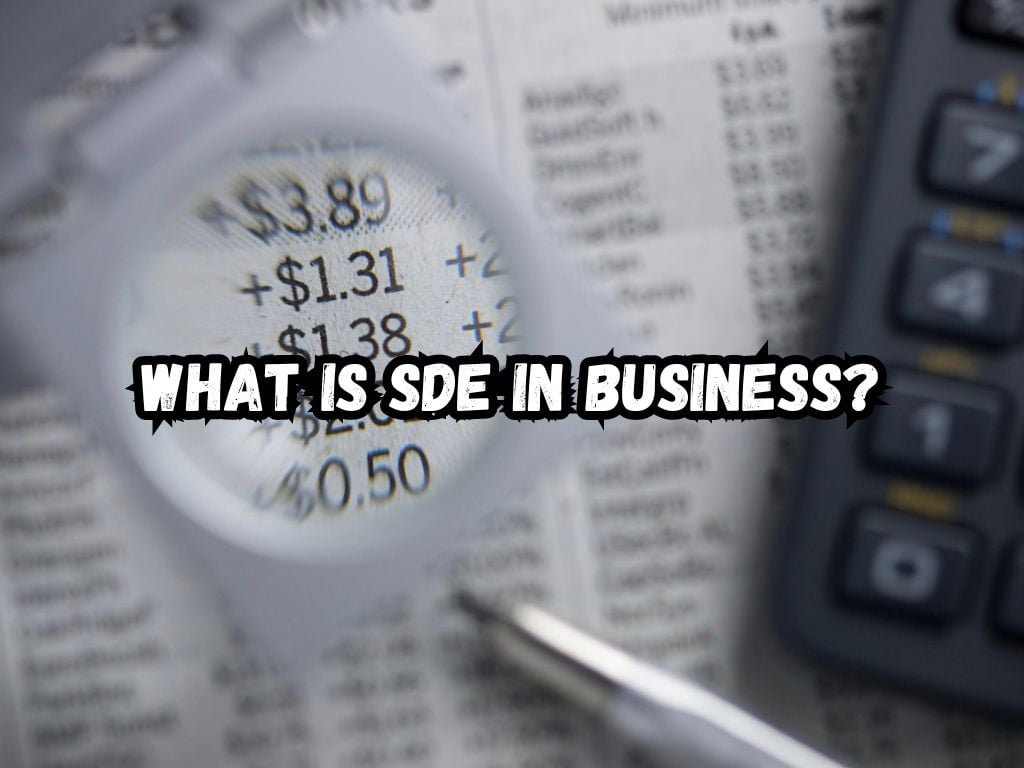Understanding key financial measures is critical for a business owner. Among them, Seller’s Discretionary Earnings (SDE) stands out as an essential terminology. But, what is SDE in business?
It provides valuable insights into a business’s financial health, helping in strategic planning and decision making. This article seeks to offer a deep dive into the world of SDE.
What is SDE in Business?
Seller’s Discretionary Earnings or SDE is a financial metric utilized primarily by small businesses. Often used in business valuation scenarios like a sale, SDE provides an accurate picture of a firm’s financial health.
It consists of the profit left to the business owner once all costs of goods sold and critical operating expenses are deducted from gross income.
So, how does SDE factor into business valuation? SDE affords potential investors or buyers a clear picture of a firm’s operations, its profitability, and the potential benefits of its acquisition. It’s a valuable tool that can shape pivotal decisions.

Calculating Seller’s Discretionary Earnings
Running the numbers for SDE isn’t too complex. It necessitates some basic understanding and attention to detail.
The original point is the net operating income of a business. From this, you adjust for owner’s compensation, one-time expenses, non-operating expenses, non-cash expenses such as depreciation, and interest expense or income. This final figure represents the SDE.
Real-life examples can simplify this process. Take a business with an annual net operating income of $500,000. If the owner’s compensation sums up to $200,000 and non-cash expenses recorded are calculated to be $50,000, then the SDE is calculated as $500,000 + $200,000 + $50,000 = $750,000.
SDE VS EBITDA: Understanding the Difference
To grasp the relevance of SDE, comparing it with EBITDA (Earnings Before Interest, Taxes, Depreciation, and Amortization) is necessary. While EBITDA presents a financial outlook normalized for different owners’ taxation and financial structures, SDE presents a view normalized for different owners’ compensation strategies.
Tweaking SDE to EBITDA calls for the addition of the owner’s salary and perks as well as one-off non-operational income or expenses.
This critical difference is why smaller businesses prefer SDE. Unlike larger corporations, smaller firms can have significant owner compensation that affects their perceived profitability.

The Importance of SDE in Business Sales
The role of SDE in determining a business’s selling price cannot be overstated. It’s a mirror into the potential earnings that a buyer might expect on acquiring the business. Consequently, SDE can shape negotiations on the final purchase price.
Moreover, buyers often examine SDE in the light of their specific financial structures and strategies.
Therefore, as a business owner, consistent and comprehensive documentation of your SDE might prove beneficial in driving a robust negotiation process. Companies with high SDE are typically more fetching in the marketplace.
Improving Your SDE
It’s prudent for a business to seek ways to enhance its SDE. Basic strategies to achieve an improved SDE include reducing unnecessary expenses and boosting overall income. Moreover, ensuring expenses align with industry standards can help avoid suspicion and scrutiny from potential buyers.
Long-term benefits of fostering a high SDE value extend beyond the immediate future. Presenting an upward trend in SDE may command higher market interest and value during a business sale.
Like any financial measure, SDE should be handled with integrity and accuracy, remaining compliant with all relevant regulations and laws.
Conclusion
Comprehending SDE and its implications is crucial for small business valuation. SDE is not just a financial figure; it offers a window into a firm’s operational efficiency and future prospects.
For personalized guidance, a consultation with a financial advisor may prove beneficial. Understanding and using SDE is an essential part of the entrepreneur’s toolkit, driving value and growth in your enterprise.


 Tags:
Tags:










